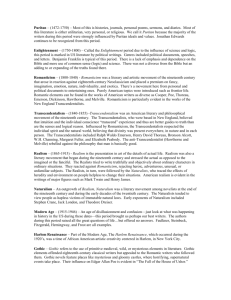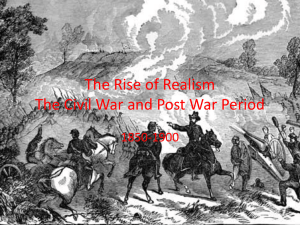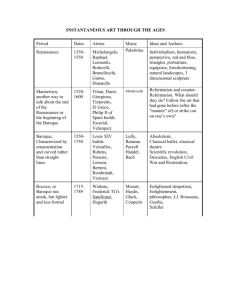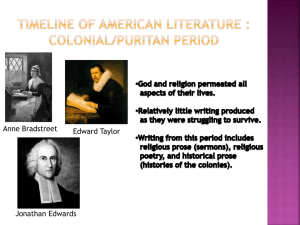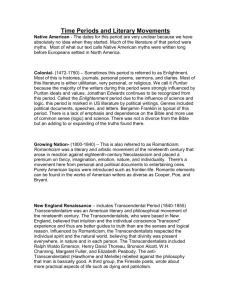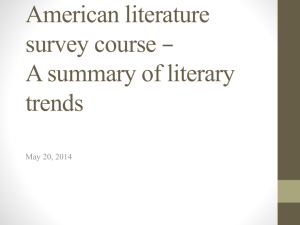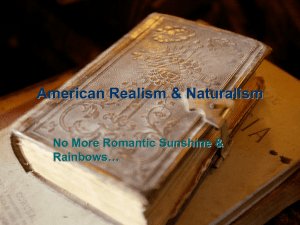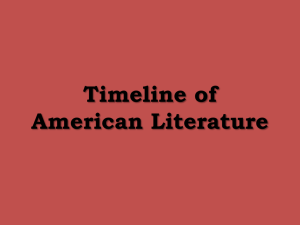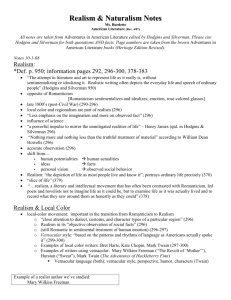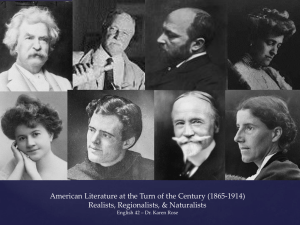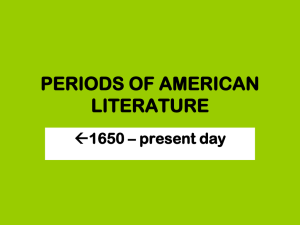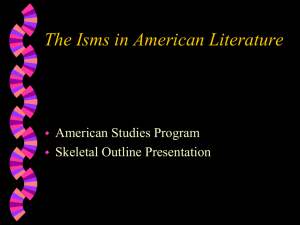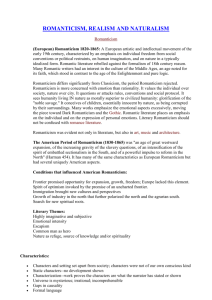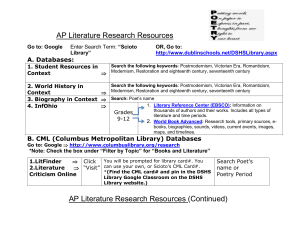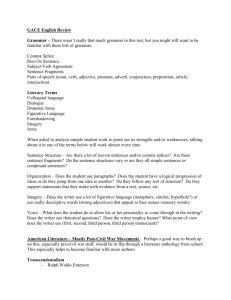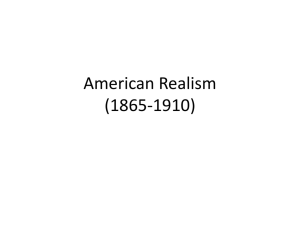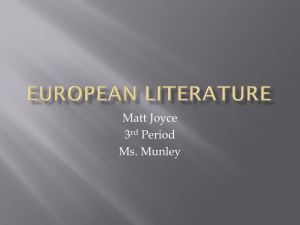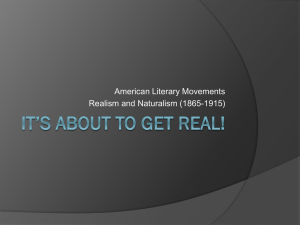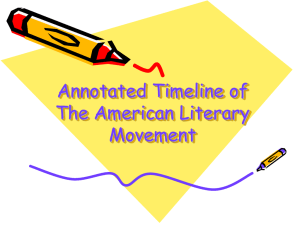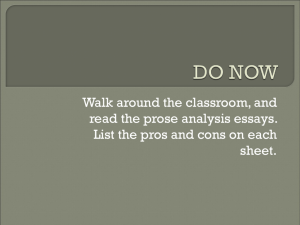Native American – The dates for this period are very unclear
advertisement
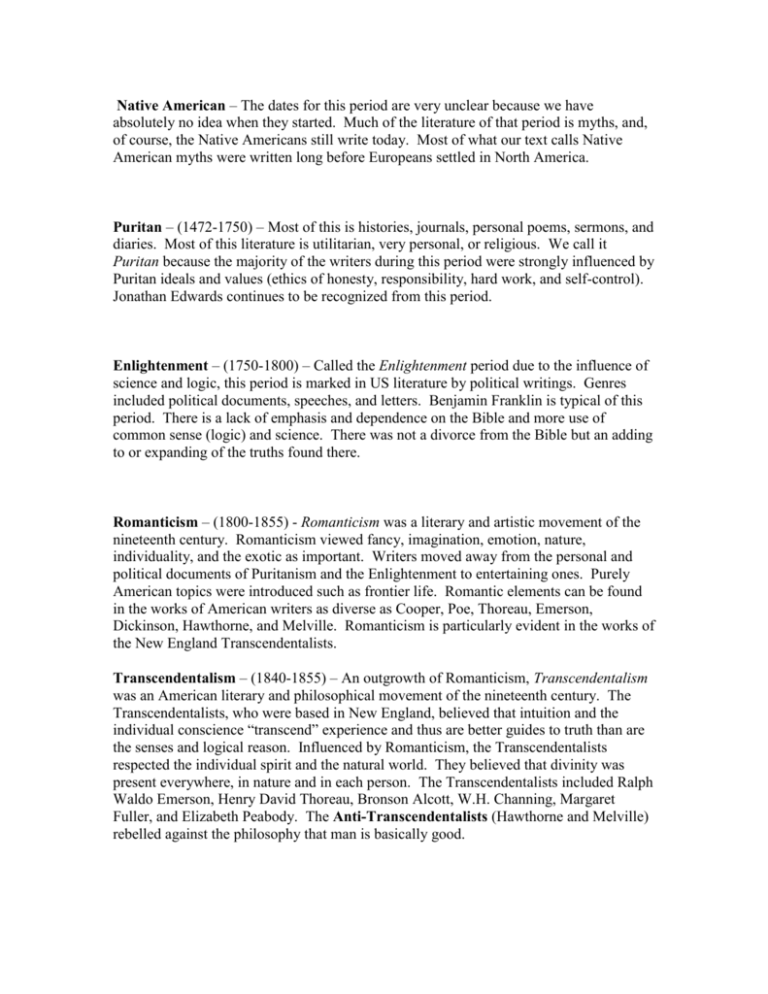
Native American – The dates for this period are very unclear because we have absolutely no idea when they started. Much of the literature of that period is myths, and, of course, the Native Americans still write today. Most of what our text calls Native American myths were written long before Europeans settled in North America. Puritan – (1472-1750) – Most of this is histories, journals, personal poems, sermons, and diaries. Most of this literature is utilitarian, very personal, or religious. We call it Puritan because the majority of the writers during this period were strongly influenced by Puritan ideals and values (ethics of honesty, responsibility, hard work, and self-control). Jonathan Edwards continues to be recognized from this period. Enlightenment – (1750-1800) – Called the Enlightenment period due to the influence of science and logic, this period is marked in US literature by political writings. Genres included political documents, speeches, and letters. Benjamin Franklin is typical of this period. There is a lack of emphasis and dependence on the Bible and more use of common sense (logic) and science. There was not a divorce from the Bible but an adding to or expanding of the truths found there. Romanticism – (1800-1855) - Romanticism was a literary and artistic movement of the nineteenth century. Romanticism viewed fancy, imagination, emotion, nature, individuality, and the exotic as important. Writers moved away from the personal and political documents of Puritanism and the Enlightenment to entertaining ones. Purely American topics were introduced such as frontier life. Romantic elements can be found in the works of American writers as diverse as Cooper, Poe, Thoreau, Emerson, Dickinson, Hawthorne, and Melville. Romanticism is particularly evident in the works of the New England Transcendentalists. Transcendentalism – (1840-1855) – An outgrowth of Romanticism, Transcendentalism was an American literary and philosophical movement of the nineteenth century. The Transcendentalists, who were based in New England, believed that intuition and the individual conscience “transcend” experience and thus are better guides to truth than are the senses and logical reason. Influenced by Romanticism, the Transcendentalists respected the individual spirit and the natural world. They believed that divinity was present everywhere, in nature and in each person. The Transcendentalists included Ralph Waldo Emerson, Henry David Thoreau, Bronson Alcott, W.H. Channing, Margaret Fuller, and Elizabeth Peabody. The Anti-Transcendentalists (Hawthorne and Melville) rebelled against the philosophy that man is basically good. Realism – (1865-1915) - Realism is the presentation in art of the details of actual life. Realism was also a literary movement that began during the nineteenth century and stressed the actual as opposed to the imagined or the fanciful. The Realists tried to write truthfully and objectively about ordinary characters in ordinary situations. They reacted against Romanticism, rejecting heroic, adventurous, unusual, or unfamiliar subjects. The Realists, in turn, were followed by the Naturalists, who traced the effects of heredity and environment on people helpless to change their situations. American realism grew from the work of local-color writers such as Bret Harte and Sarah Orne Jewett and is evident in the writings of major figures such as Mark Twain and Henry James. Naturalism – An outgrowth of Realism, Naturalism was a literary movement among novelists at the end of the nineteenth century and during the early decades of the twentieth century. The Naturalists tended to view people as hapless victims of immutable natural laws. Early exponents of Naturalism included Stephen Crane, Jack London, and Theodore Dreiser. Modernism or the Modern Age – (1915-1946) – An age of defiance, disillusionment, discontent and confusion—just look at what was happening in history in the US during these dates (WWI and WWII). An emphasis was on the role of individual perception and exploring the nature of the conscious and unconscious mind. Writers expressed the inner vision, the inner emotion, or the inner spiritual reality that seem more important than the external realities of objects and events. Literature focused on the absurd conditions of contemporary life: nameless millions dying in wars, commonplace horrors such as the Holocaust, a world in which "God is dead" and mankind is cast afloat in a chartless and unknowable world void of a spiritual center. Modernism attempts to reveal profound truths of experience and life by guiding and controlling the reader’s response to their work. The authors during this period raised all the great questions of life…but offered no answers. Faulkner, Steinbeck, Fitzgerald, Hemingway, and Frost are all examples. Post-Modern or Contemporary – (1946-present) – No clear philosophy. Whereas Modernism places faith in the ideas, values, beliefs, culture, and norms of the West, Postmodernism rejects Western values and beliefs as only a small part of the human experience and often rejects such ideas, beliefs, culture, and norms. Postmodernism is suspicious of being "profound" because such ideas are based on one particular Western value systems. Postmodernism prefers to dwell on the exterior image and avoids drawing conclusions or suggesting underlying meanings associated with the interior of objects and events. Postmodernism sees human experience as unstable, internally contradictory, ambiguous, inconclusive, indeterminate, unfinished, fragmented, discontinuous, "jagged," with no one specific reality possible. Therefore, it focuses on a vision of a contradictory, fragmented, ambiguous, indeterminate, unfinished, "jagged" world. The Postmodern writer creates an "open" work in which the reader must supply his own connections, work out alternative meanings, and provide his own (unguided) interpretation. MOVEMENT Native American Puritan Enlightenment Romanticism Transcendentali sm Naturalism Realism Modernism Contemporary TIME PERIOD GENRES CHARACTERI READ IN STICS CLASS
